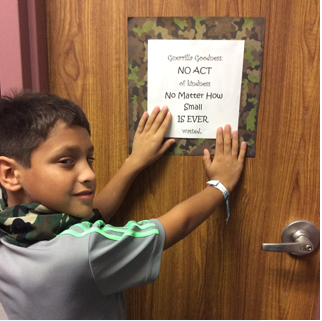
Understand that developing self-motivation is a growth process.
Avoid extrinsic rewards, discipline focused on compliance, or control, which can undermine self-motivation.


Help self-motivated individuals act in relation with their core values.
Character is often defined as “doing the right thing, because it’s the right thing to do.” Similarly, character can be said to be “doing the right thing when no one is looking.”
As educators, parents, and community members, we want our kids to do both. But how do we get there? Developing self-motivation is a growth process built on self-confidence, self-efficacy, and purposeful goals.
Schools of Character foster students’ self-motivation by providing a learning environment that nurtures students’ natural interests and develops their social emotional skills. At the same time, the learning environment is not undermined by excessive emphasis on extrinsic incentives or discipline that is focused on compliance and control.

In a culture awash in extrinsic rewards this is a challenging task. Researchers including Elliot Turiel and Larry Nucci point to the usefulness of engaging students in discussions that elevate the students’ ability to reason within a “moral domain.” Briefly, there are three classifications in Domain Theory:
The Personal Domain where choices are made based on personal desires and goals
The Conventional Domain where choices are guided by social norms, traditions and rules
The Moral Domain where choices are governed by moral principles and core ethical values that are often focused on justice and fairness
Aligning one’s personal choices and social norms with moral principles is the work of cultivating intrinsic motivation to demonstrate character for its inherent value.
Principle 7 builds on previous principles by addressing student motivation as it relates to three areas:

School recognition

Discipline policies

Classroom Management
Schools of Character help students develop social emotional skills (self-awareness, social awareness, relationship skills, and responsible decision-making) within the context of core values.
They do this by nurturing a sense of belonging and by providing students with meaningful opportunities for:

- Autonomy
- Problem solving
- Perspective taking (empathy)
- Conflict-resolution based on reflection, restitution, and the restoring of relationships
With practice and support, students begin to understand the intrinsic value of doing the right thing because it’s the right thing to do; and, they will do the right thing even when no one is looking. When students are internally or self-motivated, they act in congruence with their values and are well-equipped to make ethical decisions and act responsibly.


School Examples
Self-Reflection
How does your school balance the rewarding of a few exemplars, while recognizing as many students as possible showing good character?
What are some small steps that can be taken to move away from rewards?
How does your school use your core values as a lens to view, analyze, and reflect on the values that were not revealed in a discipline infraction?
How do we move from a discipline mentality to a learning and growth model of discipline?
[wp_quiz id=”4134″]
Research that Supports Principle 7
“The problem with making an extrinsic reward the only destination that matters is that some people will choose the quickest route there, even if it means taking the low road. Indeed, most of the scandals and misbehavior that have seemed endemic to modern life involve shortcuts.”
Drive: The Surprising Truth About What Motivates Us, by Daniel H. Pink
“This work has offered educators a framework from which to analyze the discourse patterns associated with social and moral transgressions in school settings… that have in turn provided guidance for approaches to classroom management that would foster social and moral development….”
Capturing the Complexity of Moral Development and Education by Larry Nucci and Elliot Turiel

Authored by Lori Soifer



